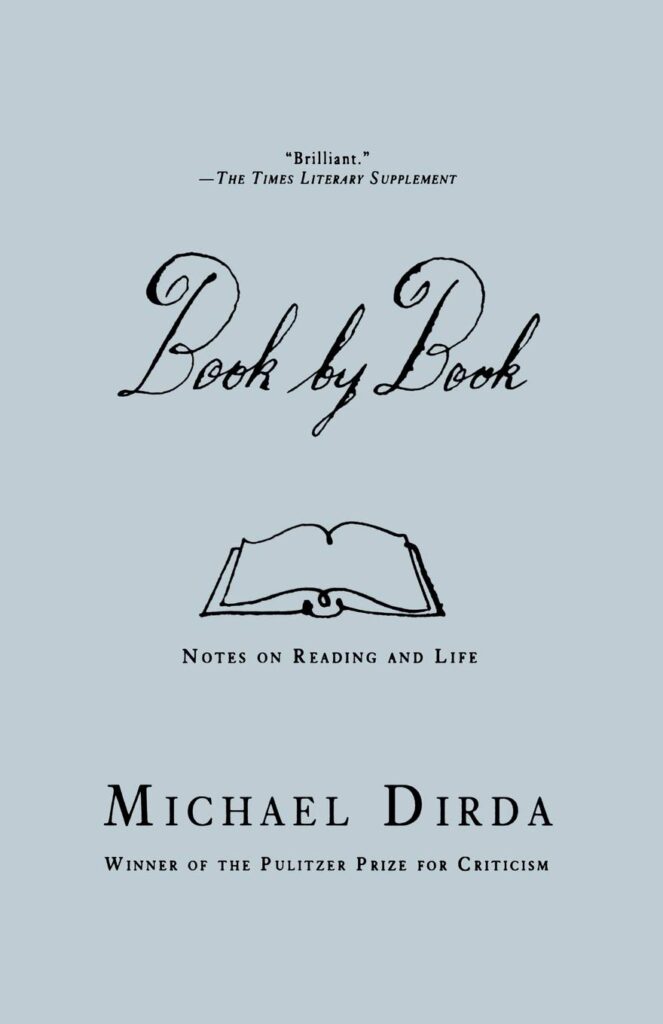For nearly 50 years, readers of the Washington Post have been privileged to have one of America’s best literary critics as their resident reviewer. Michael Dirda was the deserving victor of the Pulitzer Prize for Criticism in 1993, and the two decades since that high watermark have not diminished the quantity or quality of his output. He is best known for his recommendations and endorsements, and his deliberate attempt to steer his readers away from bland bestseller lists and towards the overlooked and unappreciated. In this second role, as literary proselytizer, he has arguably been even more successful than in his paid career as a critic, and a work like Book by Book: Notes on Reading and Life illustrates exactly why. In under 150 pages, he manages to cram in several hundred book and author recommendations, many of which will be novelties to even the well-read. He weaves these recommendations into chapters organized around aspects of life itself: learning, work and leisure, music, romance, and “matters of the spirit,” frequently employing lists (of authors, works of art, or quotations culled from his years of reading) to make his point. The effect is of a condensed tour through the knowledge and wisdom of, most likely, the best-read man in America.
The book’s second chapter pertains to education, though not in its formal sense, because no self-respecting person abrogates responsibility for their understanding of the world and their place in it. Dirda champions “the knowledge most worth having,” which for a lover of literature means “the great patterning works,” the key books that have had the most influence on writers through the ages. It would be difficult to quarrel with his list, though who among us can boast of familiarity with all of them?
- The Bible (Old and New Testament)
- Bulfinch’s Mythology (or any other accounts of the Greek, Roman and Norse myths)
- Homer, The Iliad and The Odyssey
- Plutarch, Lives of the Noble Grecians and Romans
- Dante, Inferno
- The Arabian Nights
- Thomas Malory, Le Morte D’Arthur (tales of King Arthur and his knights)
- Shakespeare’s major plays, especially Hamlet, Henry IV, Part One, King Lear, A Midsummer Night’s Dream, and The Tempest
- Cervantes, Don Quixote
- Daniel Defoe, Robinson Crusoe
- Jonathan Swift, Gulliver’s Travels
- The fairy tales of the Brothers Grimm and Hans Christian Andersen
- Any substantial collection of the world’s major folktales
- Jane Austen, Pride and Prejudice
- Lewis Carroll, Alice in Wonderland
- Arthur Conan Doyle, The Adventures of Sherlock Holmes
On top of these “major” lists, to which Dirda dedicates some explication, there are shorter lists, equally worthy of your attention and consideration, especially if, like me, you keep a handy list of “to read” books on your person at all times. For humour, for example, Dirda recommends P.G. Wodehouse (“silliness in the world of spats, aunts, and beautifully crafted sentences), James Thurber, Flann O’Brien (“the funniest man in Ireland”), and any collection of The New Yorker‘s cartoons. For biography, The Conversations of Dr. Johnson (edited by Raymond Postgate), John Aubrey’s Brief Lives, and the collected/selected letters of Flannery O’Connor, Gustave Flaubert, and Oliver Wendell Holmes. Not content to restrict himself to pure literature, he includes works of writing on art, film and music, which he assures us “can be enjoyed for their prose and the strong personalities of their authors as well as for their insights on their respective subjects.” Thus:
- James Agee, On Film
- Kenneth Clark, Civilization; Looking at Pictures
- Edwin Denby, Looking at the Dance; Dance Writings
- Ernst Gombrich, Art and Illusion
- Robert Hughes, Nothing If Not Critical
- William Ivins Jr., How Prints Look
- H.W. Janson, History of Art
- Pauline Kael, I Lost It at the Movies; Deeper into Movies
- Michael Levey, Early Renaissance; High Renaissance
- André Malraux, The Voices of Silence
- Bernard Shaw, Dramatic Opinions and Essays
- Kenneth Tynan, Curtains; Tynan Right and Left; Show People
- Giorgio Vasari, Lives of the Most Excellent Sculptors, Painters, and Architects
If you haven’t already discovered some new treasure awaiting you, your name can only be Michael Dirda.
Readers this thorough and comprehensive are rare – once-in-a-generation, lightning-strikes-twice rare. To our great fortune, Michael Dirda matched his job to his passion, and now makes a living sharing what he loves with the world. You cannot read him without a mixture of awe and envy, not to mention a pad and paper nearby to take down all the interesting writers he will introduce you to along the way.
